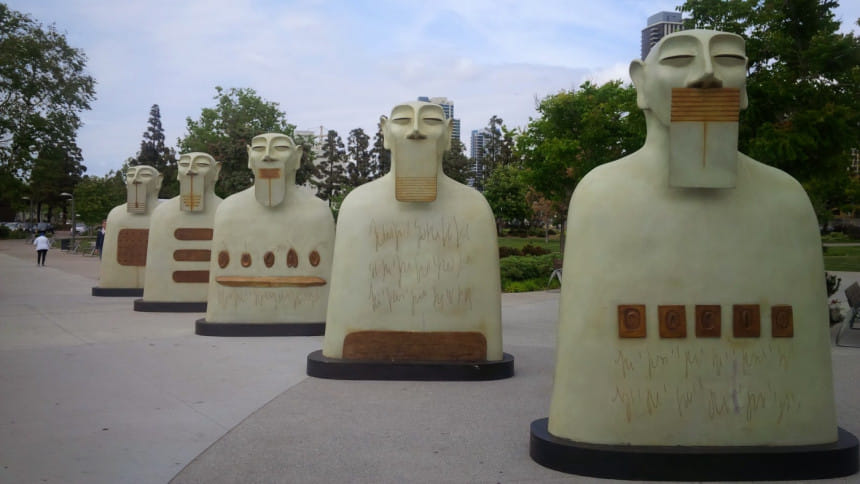Pressing the mute button

One of the most vulnerabl institutions in the world today is the free press and one of the most expendable people are the journalists. It's a great paradox of the technological age that despite the promise of liberation and democratisation, the digital revolution, increasingly taking over traditional forms of media, has somehow produced a greater concentration of power in fewer hands, with less organised counter-pressure. The silencing of the press, otherwise known as censorship - whether by elected autocrats, armed extremists, dictators wearing mirrored sunglasses, or Ivy-league attorneys stopping leaks with electronic evidence - is actually easier and more prevalent today than it was two decades ago.
In his book The New Censorship: Inside the Global Battle for Media Freedom (2014), Joel Simon, the executive director of the Committee to Protect Journalists (CPJ), writes, "Deluged with data, we are blind to the larger reality. Around the world new systems of control are taking hold. They are stifling the global conversation and impeding the development of policies and solutions based on an informed understanding of the local realities. Repression and violence against journalists is at record levels, and press freedom is in decline."
The book outlines four main reasons behind it. The first is the rise of leaders in countries such as Russia, Turkey, Venezuela, Ecuador, and Bolivia who seem to be using their power to make it very hard for journalists to function by manipulating, denouncing, threatening and jailing them. Simon calls these leaders "democratators," as they exploit their democratic mandates to govern as dictators.
The second source of censorship, according to Simon, is extremism. Armed groups now have their own ways of "telling their story" by uploading videos and posting content in the social media, thus making journalists "less essential" and more vulnerable.
Then there's the decline of the traditional media due to technological change. A lot of big media houses are closing foreign bureaus all over the world, leaving the task of critical reporting to local correspondents. Most of them probably do a better job as they are more able than their Western peers to work up sources and get to the heart of the story. But without the backing of wealthy foreign news organisations or powerful governments, their position is far more precarious. For instance, in countries like Mexico, the Philippines, Iraq and Syria, local journalists are regular targets of brutal campaigns of violence and murder by drug cartels or extremists.
Finally, there's the invisible global hand of digital surveillance. The ordeal of journalists and writers in China and Russia make headlines in Western media. But the US, the champion of democracy, is no angel when it comes to freedom of press. Uncle Sam promises never to jail journalists for doing their job, but uses the considerable power of the state machinery to plug any leaks it deems harmful to "national interests". And in Modi's India, books are frequently withdrawn after publication because of dubious legal cases brought on behalf of supposedly "aggrieved groups".
Democratic erosion thus takes many shapes - the hardest to see can be the ones right in front of our eyes. If an atmosphere can be created where laws are not well defined, journalists, intellectuals and artists stifle themselves in order not to run afoul of vague laws and even vaguer socio-political pressure.
Journalism or any kind of expression requires not only freedom but the assumption of freedom. If a journalist is constantly afraid of the consequences of his choice of subject or his interpretation of it, then his choices are likely to be determined less by truth and more by fear, the unwritten law. If we are not confident of our freedom, then we are probably not free.
In some ways, an even greater danger than imprisonment or violence is the internal mute button known as self-censorship. Once it's activated, governments or other entities don't have to worry about a thing. Once we learn how to keep ourselves from voicing our thoughts, we forget how to think them in the first place. And ideas perish at conception.
What could be more dangerous than that?
The writer is a member of the editorial team at The Daily Star.

 For all latest news, follow The Daily Star's Google News channel.
For all latest news, follow The Daily Star's Google News channel. 



Comments